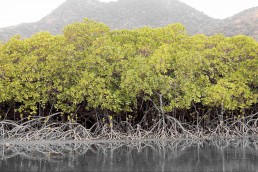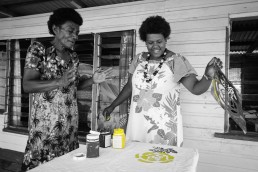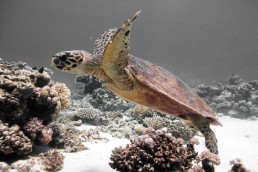Marine Protected Areas
Sustainable Marine Protected Area Management
The only NGO working on-site in Macuata.
The coast of Macuata is bordered by Fiji’s incredible 150 km Great Sea Reef (GSR), known to be the third largest consistent barrier reef in the world. It is a hotspot of marine biodiversity and provides for a significant proportion of Fiji’s fish. It is also renowned as home to the best fishers in the nation. Over time, however, it has been exposed to increasing fishing pressures from residents and outsiders of Macuata, as well as agricultural runoff and sedimentation from the loss of upland and coastal forests.
C3 is the only NGO working on-site with traditional leaders and communities to protect the Great Sea Reef within the Macuata Qoli Qoli, or traditional fishing grounds. Although big international non-profits were previously involved in the establishment of these tabu areas, they have no physical presence on the ground to ensure sustainable local management. This is the critical role fulfilled by C3 as a permanent technical partner for the communities, with its office strategically placed in Labasa town.
By the end of 2020, the Fiji Government commits to establishing an EEZ-wide network of Marine Managed and Protected Areas representing thirty percent of the marine environment—an ambitious and important target. C3 works to contribute to this goal, while relaying concerns about long-term sustainability of marine protected area management. We are aware that so many MPAs are mere ‘paper parks’ with no positive impacts on local fisheries management, habitat replenishment and conservation, and community engagement in monitoring and management. C3 seeks to create and support this impact in working with Marine Protected Areas in Fiji.
Our award-winning documentary, produced in conjunction with Scripps, shows the challenges facing our communities. Watch it here.
A holistic stewardship model.
C3’s innovative and successful environmental stewardship model focuses on assessing the current functioning of MPAs in a holistic manner: traditional knowledge and tabus, governance, socio-economic and biodiversity assessments, and financial sustainability. Based on this data, we develop community capacity for governance and implementation of management plans.
Ours is the only programme that ensures delivery of key community services such as diversified income generation, improvements in health (e.g. WASH programme), and education services. These essentials ensure that MPAs benefit local populations and reduce unsustainable practices such as fish drives, which communities use when they are in need of cash.
Indeed, C3 assists with the provision of additional water storage facilities on Kia Island, as islanders suffer from droughts that have become increasingly prolonged and intense. Our WASH programme makes villagers aware of the role of correct water conservation, handling, and hygiene to prevent water-borne diseases. Our additional collaboration with the Red Cross highlights awareness about tuberculosis and minimizing its risks in remote communities throughout Macuata.
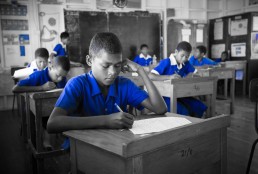
We work with the following agencies and organizations:
C3 has supported Kia’s MPA for the past nine years.
Sustained, intensive community outreach regarding fisheries regulations, climate change, species, and habitats is a key focal area. Only by fully understanding the purpose and objectives of MPAs can the community be motivated and mobilised to protect them.
C3 helped establish the Qaranvai mangrove MPA, and currently assists with the management of eight other Locally Managed Marine Protected Areas across Macuata province. By 2023, the number of LMMAs will grow from eight to fifteen, thanks to a partnership between C3 and the European Union.
The number of trained fish wardens will also increase from thirty in 2019 to 40 in 2022. These wardens are crucial to managing and monitoring protected areas, and monitoring control illegal fishing activities.
MPAs cannot be managed in isolation of terrestrial impacts, especially in small island developing states (SIDS). Therefore, C3 Fiji also applies a Ridge to Reef approach, working with communities upstream to replant riparian vegetation and native montane forests.
Building resilience to climate change is so essential in these communities. They are at the forefront of environmental disturbances such as widescale coral bleaching, severe coastal erosion, and increasingly frequent and devastating cyclones.
One of our key successes is reducing dependence of communities solely on fishing as a source of income. C3 has now established fifteen community enterprises across five communities.
We have also recruited and trained thirty Conservation Ambassadors, who are community volunteers in charge of training and educating others in sustainable development and environmental protection.
The immensely popular youth environmental leadership programme, the Reef Rangers, now has a cohort of more than 1,000 members across twenty schools in Macuata province. This number is expected to grow to 2,500 by 2023, with at least half of them girls. Reef Rangers educate their own communities about key conservation issues, and assist with practical activities such as beach clean-ups, seagrass monitoring, and mangrove reforestation.
By 2022, twenty-five schools in Macuata and Cacuadrove will be participating in our network. Fifty school teachers, at least half of which are women, will be trained to tackle biodiversity and climate change lessons. This is accompanied by the design of pedagogic materials, and as a result, 500 Teacher Training Toolkits will be distributed in the same year.
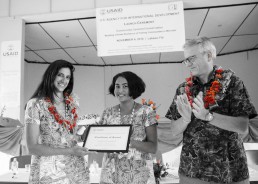
Related Case Studies
Contact
C3 Fiji108 Nasekula Road, Labasa
C3 Fiji (Community Centred Conservation (Fiji) Limited), in accordance with the Companies Act, is registered as a non-profit organization in Fiji under the Registrar of Companies with Company Registration No. RCBS2014G3314.

